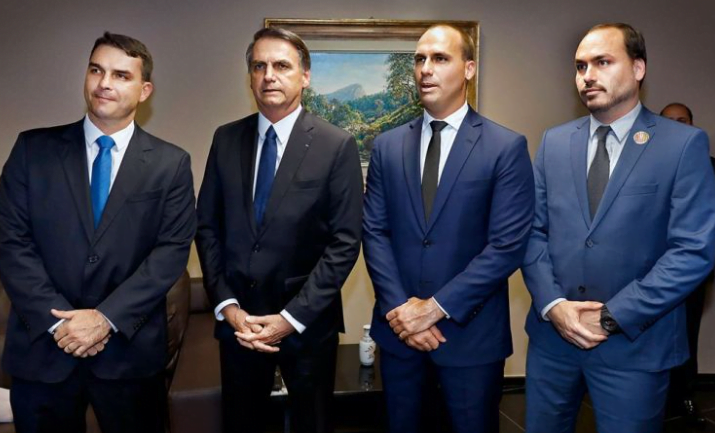By Kenneth Maxwell
The government of Brazil continues to face major challenges.
Many are generic and long standing and not all of them are the result of President Bolsonaro’s “method” of governing.
But many are.
And they are assisted mightily by the antics of Bolsonaro’s three sons, Flávio, Carlos and Eduardo. All three are elected officials. All of them highly ideological, extremely active, and very disruptive.
But then so was their father during his 27 years in Congress, so no one should be surprised by this.
Brazil has known the influence of family cartels before, yet they usually acted behind the scenes and with discretion.
The Bolsonaro family is far from being subtle.
And Olavo Carvalho, their “guru” in Richmond, Virginia, with his scatological tweets is even less so.
The major hope of those in the financial markets (both domestic and international) was that his super-minister of the economy, the university of Chicago trained economist, Paulo Guedes, would deliver on his promise of a radical reform of the state dominated economic model perused by Brazil over the past half century, by cutting back state intervention, and by privatisation, and above all by pushing through a reform of the system of social security (providência).
All economists recognise that the current system is unsustainable.
But social security reform has always been extremely difficult in Brazil because so many vested interests are affected, and these have always been able to effectively lobby in Congress to prevent any real change. This was always going to be a difficult nut to crack.
Not surprisingly it is proving to be so.
Bolsonaro promised Guedes a free hand in economic policy.
This has not prevented Bolsonaro interfering with appointments at the secondary level which has led to resignation of the head of the Brazilian National Development Bank (BNDS), Joaquim Levy, on Sunday June 16th. Levy is widely respected both domestically and internationally, having been a leading figure at the world bank in Washington DC., as well as Dilma Rousseff’s minister of the economy, until he resigned in the face of her contestant interference.
History has repeated itself. Bolsonaro was not happy with Levy’s appointments and he was in effect fired.
The financial markers reacted negatively to this move.
Paulo Guedes moved quickly to appoint Gustavo Montezano (38) from the desestatização (literally the “de-state-ization” ) unit in the ministry of the economy. Montezano is a young former investment banker with BTG Pactual, one of Latin America’s largest investment banks, who headed the bank’s commodities related business in London.
But perhaps most significantly he is a friend of Bolsonaro’s son, Eduardo. He lived in the same building as the Bolsonaro’s in Rio de Janeiro during the 1990, and is the same age as Eduardo Bolsonaro (38).
Levy’s resignation, however, revealed once again Bolsonaro’s very limited capacity for loyalty, or to fully back any of his appointments, and especially when they run into one of his sons, who do not hesitate to take to their “tweets” to undermine and defeat their perceived enemies, egged on of course from afar by their foul mouthed “guru” of Richmond.
The second major constraint on Bolsonaro’s plans has been the attack on Sérgio Moro, his super minister of justice and public security, and by extension on the whole anti-corruption “car wash” investigations that Sergio Moro headed when he was a federal judge in Curitiba, Paraná.
It is ironic that Glen Greenwald, the American lawyer who was at the heart of the publication of secrets US government classified information involving Chelsea Manning, Edward Snowden and Julian Assange, should now be at the heart of the downloading of the confidential communications between Sérgio Moro and Deltan Dallagnol, the head of the federal “lava jato” anti-corruption task force in Rio de Janeiro.
This is the result of the massive hack of the private communications between Moro and Dallagnol, published beginning on June 10th, on-line by “The Intercept” an internet site funded by the American billionaire founder of eBay, Pierre Omidyar, and run in part by Glen Greenwald, who lives in Rio de Janeiro with his husband, David Miranda.
David Miranda is now a federal deputy from Rio de Janeiro, for the socialism and liberty party (psol) having taken the seat of Jean Wyllys, who is now in self imposed exile after death threats.
These threats need to be taken very seriously in Brazil, especially in Rio de Janeiro, were a black lesbian council woman, Marielle, and her driver, were assassinated by milícias linked to the police and, it is alleged, to Bolsonaro’s sons.
The fallout from the “intercept” hacks has already greatly weakened the position of Sergio Moro.
He has become more depended on the support of Jair Bolsonaro, and the hacked messages has called into question the whole of the lava jato investigation, and above all the conviction and jailing of former two-term president Lula (as well of course of the many leading politicians and businessmen caught up in the massive Petrobras corruption scandals.)
Welcome to Brazil in 2019!
Dr. Maxwell is currently visiting Brazil.
The featured photo is found here:
https://en.mercopress.com/2019/02/18/bolsonaro-learning-the-hard-way-family-and-politics-don-t-mix


